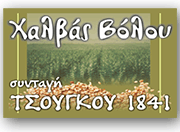
Nutritional Information
The “Volos handmade Halvah” is not only one of the most famous nourishment in our country during the fasting periods, especially when Lent takes place, where it can be consumed as a primary meal or as a dessert, but it is also beneficial for our health.
It is rich in vitamin B, vitamin E, calcium, phosphorus, magnesium, zinc, selenium and antioxidants. Regarding its calorific value, the combination of its ingredients, sesame and sugar, gives us high energy.
The fact that halvah is composed of 60%-65% tahini (tahini = 100% grounded sesame), has as a result the beneficial properties of the seed to be transferred to the sweet. The concentration of fatty acids in the halvah is almost the same as in tahini. The higher content of nutrients in the tahini is of fatty acids. The majority is monounsaturated and polyunsaturated. The concentration of the saturated fatty acids is low. The consumption of polyunsaturated fatty acids is said to be vital to the human body as it cannot compose. For these reasons halvah and tahini form nutritional food, that have unique- beneficial properties, such as their frequent consumption reduces the cholesterol in our body.
When halvah is consumed with food that contains lysine, like dried fruit and pulses, the protein that emerges is of high biological value and availability while it approaches the biological value of the animal protein. Consequently halvah whether enriched with dried nuts or with pulses, forms a good protein source of high biological value for the people that are vegetarian or fast.
Halvah and tahini are eaten at breakfast, especially halvah and as a sweet after the meal and certainly because of the above mentioned properties, forms one of the most healthy Greek sweets. (taste it with lemon and cinnamon)
Tahini because of its large concentration of calcium makes up an ideal nourishment for the children.
Nutritional Information of Halva per 100gr
Energy (cal)………………………..517
Proteins (g)……………………..13.4
Carbohydrates (g)……………44.7
Total Fats (g)……………………33.2
Saturated (g)……………………5.1
Monounsaturated (g)…………..13.3
Polyunsaturated (g)………………14.8
Cholesterol (mg)…………………….0
Sodium……………………………………0
Iron Fe (mg)……………………………..2.7
Potassium K (mg)……………………280
Magnesium Mg (mg)………………114
Nutritional Information of Tahin per 100gr
Carbohydrates……………….11.2 gr
Proteins…………………………30.0gr
Fats…………………………………50.5gr
Energy contents………………..617Kcal



